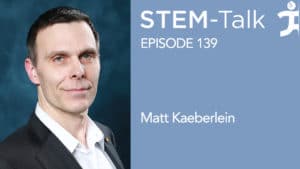STEM-Talk explores rapamycin and the biology of aging
Published 7.26.22
On episode 139 of STEM-Talk Dr. Matt Kaeberlein talks about the biology of aging, rapamycin, and what he has learned about slowing the aging process.
Kaeberlein is a professor of pathology at the University of Washington who is well-known for his investigations into the basic mechanisms of aging. Much of his research is focused on identifying interventions that promote healthspan and lifespan.

In a wide-ranging interview, STEM-Talk cohosts Dr. Ken Ford and Dr. Dawn Kernagis talk to Kaeberlein about longevity, his research into fasting and caloric restriction, and his recent investigations into rapamycin, the only known pharmacological agent to extend lifespan.
Kaeberlein’s 2017 paper that showed rapamycin may reduce the mortality of companion dogs landed on the front page of The New York Times and was picked up by news outlets around the world. Other topics that Ford and Kernagis discuss with Kaeberlein include:
- His attempts to uncover the molecular mechanism behind lifespan extension via calorie restriction.
- Research into how inhibiting mTOR has been shown to extend the lifespan of insects, rodents, and animals.
- His 2006 study that showed fasting extends lifespan in worms more than caloric restriction.
- An article he published last year that summarizes several of the most popular anti-aging diets and compares them with classical caloric restriction.
In addition to his work in the Kaeberlein Lab at the University of Washington, Kaeberlein is the co-director of the Nathan Shock Center of Excellence in the Basic Biology of Aging and the founding director of the Healthy Aging and Longevity Research Institute at the University of Washington.
He also is the founder and co-director of the Dog Aging Project.
STEM-Talk is a biweekly podcast that is part of IHMC’s outreach initiatives. IHMC is a not-for-profit research institute of the Florida University System where researchers pioneer science and technologies aimed at leveraging and extending human capabilities. For more information, visit ihmc.us.
Latest News
- STEM-Talk: Michael Schmidt on building a space-faring civilization
- Florida Blue award supports health and wellness research and outreach at IHMC
- STEM-Talk: Ken Forbus on AI and his development of the Structure Mapping Engine
- STEM-Talk: Pascal Lee on returning to the Moon — and heading to Mars
- Aging Symposium draws experts to IHMC
- IHMC hosts Fredric G. Levin Lung Care Symposium March 27-28 in Pensacola
- Humanoid robotics and exoskeletons lead latest IHMC newsletter
- Celebrate Robotics Week at IHMC Open House on April 11, 2025
- Registration open for 2025 Summer Robotics Camp

